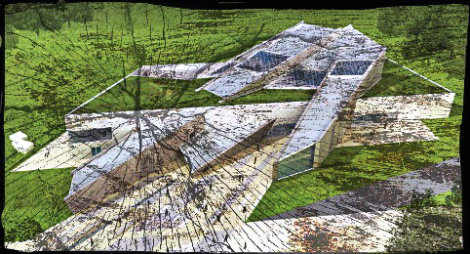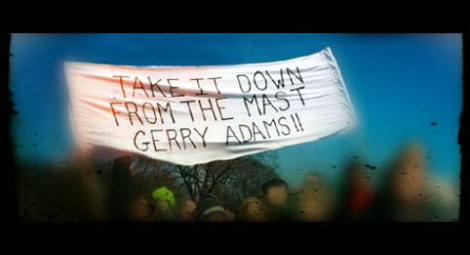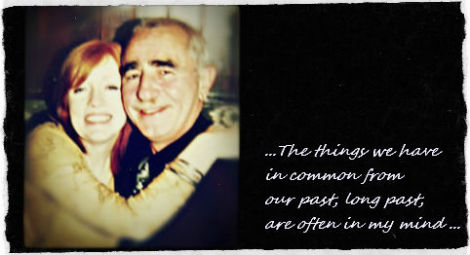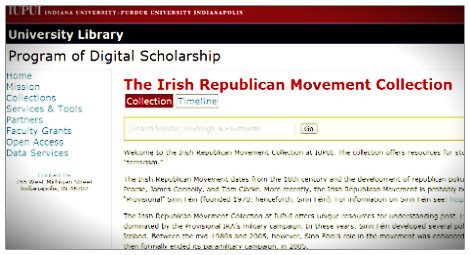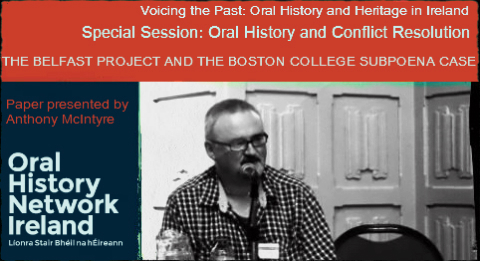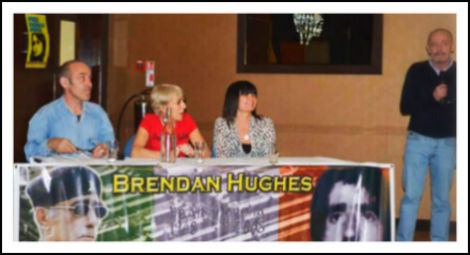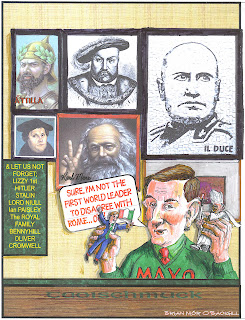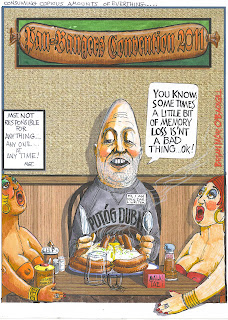Wednesday's debate in the Dáil focused on the issue of the internment of Marian Price and Martin Corey. The transcript of the exchanges follows.
Wednesday, 20 February 2013
Priority Questions
Northern Ireland Issues
5.
Deputy Clare Daly (Ind) asked the Tánaiste and Minister for Foreign Affairs and Trade the steps he has taken in his dealings with the Northern Ireland and British authorities to highlight the wide-spread concern that exists in relation to persons (details supplied) being in prison without knowing the charges against them and without an open trial.
Deputy Eamon Gilmore (Lab): I am very aware of the cases to which the Deputy refers and my officials monitor these and other cases very closely. The first individual referred to has been detained since 13 May 2011, following the revocation of her life licence by the Secretary of State for Northern Ireland. Genuine concerns about several aspects of this case have been raised by Deputies on many occasions, and I have raised them very frankly with the British Government, most recently when I met the Secretary of State for Northern Ireland on Monday, 11 February. I have been advised that the Parole Commissioners for Northern Ireland will determine in March on the issue of her continued detention.
In relation to the second individual referred to, the British authorities have confirmed that he was released under licence in 1992. The Secretary of State for Northern Ireland revoked that licence in April 2010 and the individual, has as a result, been in custody for the past two years and nine months. I understand that an appeal on the case will be heard by the Supreme Court in Belfast shortly. As the case is the subject of an ongoing legal process, it would be inappropriate to comment further at this time.
Deputy Clare Daly: I appreciate that the Tánaiste has raised those matters but all of us need to do more. We were among a cross-party delegation that went to Maghaberry Prison where we visited both Martin Corey and Marian Price in recent weeks. The health of Marian Price in particular is a cause of grave concern. We all have a role in putting pressure, not just on the British authorities but also on the Northern Ireland Administration. Deputy O’Sullivan is correct; the Minister, Mr. Ford, could release the two individuals on compassionate grounds at the stroke of a pen.
The issue is a serious one. I am shocked that the media have not taken it up to a greater extent. The cases involve two people who have been in prison for almost two and three years, respectively. They do not know the charges against them. Their solicitors are not entitled to the evidence against them. In the case of Marian Price’s parole commission hearing, a representative is being appointed on her behalf to represent her. This is a person she cannot meet, who cannot discuss matters with her or talk to her. This person will attend her hearing, which will be held behind closed doors, which she herself is not allowed to attend. If that was taking place in a tin-pot African dictatorship, we would be banging our drums demanding justice. It is happening on this island and it is absolutely unlawful and disgraceful. I echo the point made previously on whether we can get an official from the southern Government to be a public voice at the hearing. Could we demand that the case is held in public and that Marian Price and her solicitor could attend? Could we begin to address the issues in the broader European Union community because it is a serious erosion of human rights?
Deputy Eamon Gilmore: Two cases were referred to in the question. In one case a Supreme Court case is shortly to be held on it so I cannot say anything much further in that regard.
In the second case the individual was sentenced to two life terms of imprisonment – 20 years imprisonment to run concurrently. In March 1975 the individual concerned was transferred from prison in England to Armagh Prison. On 30 April she was released from Armagh on humanitarian grounds. The release was on licence and the licence was then revoked on 15 May 2011 by the then Secretary of State for Northern Ireland. An issue arose about the terms of the revocation. The Secretary of State for Northern Ireland and the Northern Ireland Office inform us that the parole commissioners considered the terms of the royal prerogative of mercy after receiving submissions on behalf of the prisoner, that the Secretary of State ruled that the life sentences were not remitted by the royal prerogative of mercy, and that the individual remained subject to the life sentence.
The prevailing policy within prisons themselves is a devolved matter which is the responsibility of the Department of Justice in Northern Ireland. The Northern Ireland Prison Service is an executive agency of the Department and the Police Service of Northern Ireland. I have received a briefing on the assessment of the parliamentary delegation which visited Maghaberry Prison. My officials are monitoring the situation closely. It is the subject of discussion between the Secretary of State and I and between officials of my Department and corresponding officials in the Northern Ireland Office. That will continue to be the case. I am very much aware of what is going on.
Deputy Clare Daly: If people have done something wrong and have broken the law, they should of course be brought to justice and to trial. This is the opposite case where people are imprisoned for a period of years whose cases have been heard in open court. They have been found to have no case to answer and then secret evidence has been introduced behind closed doors. That is a fundamental attack on human rights and civil rights for everyone in Irish society and beyond.
We do not know that the royal pardon did not cover the sentences because the official excuse is that the pardon has gone missing. Therefore, how do we know what was specified in it?
Why does Martin Corey have to go to the Supreme Court? An open court has already said he has no case to answer. These are serious matters. It is 41 years since Bloody Sunday when people marched against internment. Now there is a new Administration and a new power structure but people are in prison who do not know the reason they are there. The Northern Ireland Minister for Justice could release those two people at the stroke of a pen. I hope that when we have next month’s ministerial Question Time, we do not have to raise the two cases in question because if Marian Price is not released soon on compassionate grounds, given her ill health, it will lead to a seriously destabilising situation in the North for the foreseeable future.
Deputy Eamon Gilmore: In one case, as I said, there will be a Supreme Court hearing and my information is that it is due to be held shortly. A date was set for it earlier in the month but the hearing was not held on that date. I understand a new date will be set for it shortly.
My understanding is that the parole commissioners will hear the Marian Price case in early March. Three dates have been indicated to me as to when the case will be held and it has been indicated to us that there will be a decision shortly after that. Clearly, we cannot prejudge what that decision is likely to be and I will certainly be keeping a very close watch on what is happening and my officials will be doing that on my behalf.
Other Questions
Northern Ireland Issues
9. Deputy Gerry Adams (SF) asked the Tánaiste and Minister for Foreign Affairs and Trade if his attention has been drawn to the various legal proceedings currently being taken by persons (details supplied) to set aside the indeterminate sentence being imposed on them by the British Secretary of State, Ms Theresa Villiers, without access to judicial proceedings in which they can see, hear and challenge the evidence against them; and if he has expressed his abhorrence of the denial of fair judicial procedure to these two Irish citizens
29. Deputy Mick Wallace (Ind) asked the Tánaiste and Minister for Foreign Affairs and Trade in view of the fact that Marian Price has been interned without trial for a period of nearly two years, if he will consider raising the matter at a European level; and if he will make a statement on the matter.
30. Deputy Frank Feighan (FG) asked the Tánaiste and Minister for Foreign Affairs and Trade if he will provide an update on the Marian Price case; and the action he is taking to advance the case
33. Deputy Aengus Ó Snodaigh (SF) asked the Tánaiste and Minister for Foreign Affairs and Trade if his attention has been drawn to the deterioration of the physical and mental health of a person (details supplied); his views on their prison conditions; and if he has discussed them with British Secretary of State, Theresa Villiers.
63. Deputy Luke 'Ming' Flanagan (Ind) asked the Tánaiste and Minister for Foreign Affairs and Trade the discussions he has had with the Northern Ireland Office and the Secretary of State with regard to Marian Price; and if he will make a statement on the matter.
66. Deputy Damien English (FG) asked the Tánaiste and Minister for Foreign Affairs and Trade if his attention has been drawn to the fact that the Stormont Assembly Minister, David Ford, denied until the last minute compassionate parole to persons (details supplied); if he will raise with Minister Ford at their next meeting the need to address compassionately requests from both in view of the limbo position in which they have been placed, having being neither charged with an offence, nor given a release date, granted bail or seeing the evidence against them; and his views on a royal pardon issued to one of the persons in the 1970s being conveniently misplaced.
67. Deputy Martin Ferris (SF) asked the Tánaiste and Minister for Foreign Affairs and Trade if he has raised with the British authorities the continued detention-internment without trial of two Irish citizens (details supplied) in prison; and if he has demanded their immediate release.
Deputy Eamon Gilmore: I propose to take
Questions Nos. 9, 29, 30, 33, 63, 66 and
67 together.
I am very aware of the cases to which the Deputy refers and my officials monitor these and other cases very closely. The first individual referred to has been detained since 13 May 2011 following the revocation of her life licence by the Secretary of State for Northern Ireland. Genuine concerns about several aspects of this case have been raised by Members on many occasions, and I have raised them very frankly with the British Government, most recently when I met the Secretary of State for Northern Ireland last Monday, 11 February. I have been advised that the parole commissioners will determine in March on the issue of her continued detention.
In relation to the second individual referred to, the British authorities have confirmed that he was released under licence in 1992. The Secretary of State for Northern Ireland revoked that licence in April 2010 and the individual has as a result been in custody for the past two years and nine months. I understand an appeal in relation to the case will be heard by the Supreme Court in Belfast shortly. As the case is the subject of an ongoing legal process, it would be inappropriate to comment further at this time.
Deputy Seán Crowe: There has been some discussion of this but I want to add a few points. The nature of these cases involves unseen and unknown evidence, so it is difficult for people to defend themselves when they do not know what evidence has been presented against them. The common denominator is the involvement of shadowy figures in the background from MI5 and MI6 who are not friends of the Irish peace process. The Minister said he would get the report of the delegation that visited Marian Price. That delegation has stated that her health is getting worse and we know she is only allowed to exercise in a corridor late at night, with no access to the fresh air or the environment. She is also concerned that there is talk of closing the wing she is on and returning her to what she described as the dungeon. She said that part of the problem with the dungeon was that she was refused access to medication. The Red Cross has been refused access to Hydebank where she is being held. Will the Minister raise that with the British Government?
Deputy Eamon Gilmore: I have already brought to the attention of the Secretary of State the previous visit that was undertaken by a group of Oireachtas Members whom I subsequently met and whose report and assessment I was given. On a continuing basis, we have raised with the Minister for Justice in the Northern Ireland Executive the conditions in which Ms Price is being held. The immediate focus is on the hearing by the parole commissioners that is due in early March.
 Today, there will be a demonstration against Amnesty International for its disproportionate support of the Islamist perpetrators of crimes against humanity, genocide and war crimes. I am also vehemently opposed to the death penalty in all cases (it’s nothing short of state-sponsored murder), but Amnesty could do much more to support the victims and the demand for justice.
Today, there will be a demonstration against Amnesty International for its disproportionate support of the Islamist perpetrators of crimes against humanity, genocide and war crimes. I am also vehemently opposed to the death penalty in all cases (it’s nothing short of state-sponsored murder), but Amnesty could do much more to support the victims and the demand for justice.












